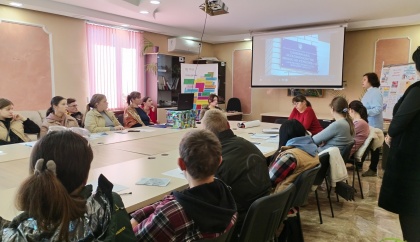
A unique project in the town of Kiliya in Odesa region combines cinema with human rights awareness and social reintegration.
Reprinted from Mahala.
The Docudays UA Documentary Film Club, established in 2023 at the local district office of the Probation Center, organizes screenings and discussions of documentary films for individuals sentenced to non-custodial penalties. These events offer participants an opportunity to deeply reflect on complex social issues, moral choices, and personal responsibility. This project exemplifies how culture can serve as an effective tool for transformation in the lives of people preparing to reintegrate into society after serving their sentences, opening new paths for personal growth and understanding of one’s self.
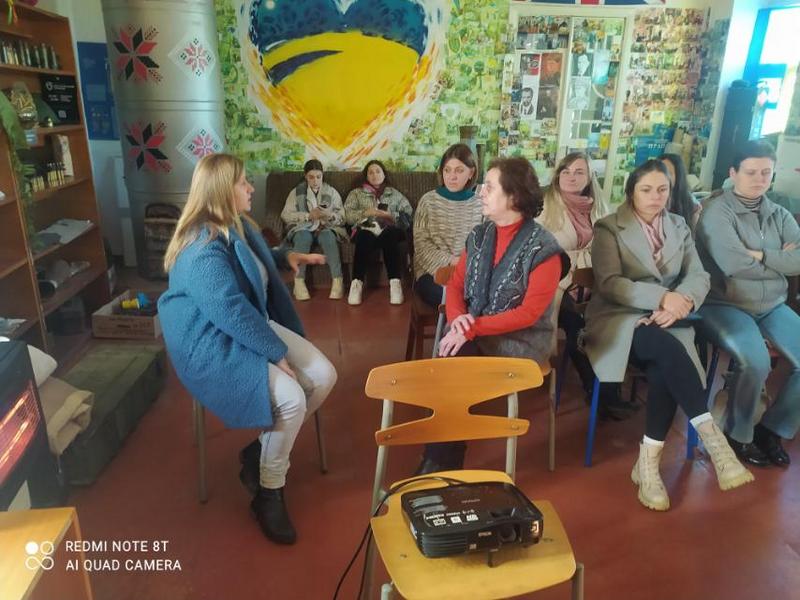
A film club meeting at the Izmail District Department No. 2 of the “Probation Center” Branch
Probation in Ukraine serves as a vital tool for resocialization of individuals who have broken the law. It allows convicted persons to serve their sentences within the community while actively integrating them into society. “In order to reintegrate a person who has stumbled and broken the law back into society, we must support them in finding employment and provide them with social and psychological assistance,” explains Lyudmyla Yakymenko, Head of the Izmail District Department No. 2 of the Probation Center branch in Odesa region. “Our office serves two communities, which comprise the towns of Kiliya and Vylkove, as well as 14 neighboring villages. We do our best to improve the lives of people under our supervision. It's not easy. Many of them travel up to 40 kilometers by bicycle for their weekly meetings with probation officers. Sometimes it’s cold, and they come in slippers without socks, because they have nothing else to wear. We look for ways to help them — sometimes using our own money to buy them socks, offer them a bun, or brew some hot tea. We often say that our work probably includes these quiet ways to save the world.”
Currently, more than 120 individuals are registered with Izmail District Office No. 2 of the Probation Center. According to Maria Hontar, the department’s senior inspector, the number of probationers has increased since the beginning of the full-scale invasion: “Many people have been sentenced for theft. In the past, it was possible to find occasional work in the villages, e.g. helping with household chores or doing repair work, but it’s much more difficult now. Sometimes, a person gets drunk, steals someone’s goat or bicycle, and ends up as a convict. There are also several individuals sentenced for possession of unregistered weapons or poaching. We are also working with collaborators. We supervise people from very different backgrounds.”
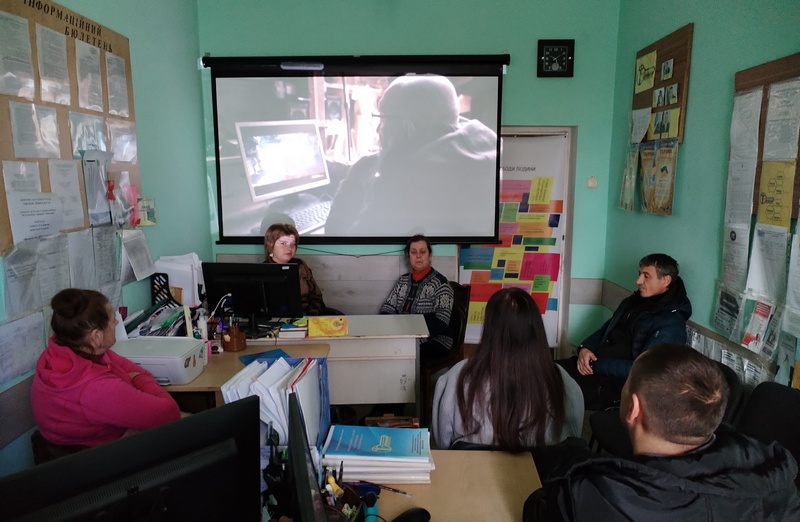
Meeting of the film club at the Izmail District Department No.2 of the “Probation Center” Branch
The small team at the district branch of the Probation Center in Kiliya tirelessly seeks new ways to support convicted individuals and assist them in returning to normal life.
“When we were offered the opportunity to open a Docudays UA Film Club at the probation branch, we felt a bit apprehensive: there was already so much work to do, and our staff had reduced since the start of the full-scale invasion. One of our colleagues left the country, and others are now serving in the Armed Forces of Ukraine, so there are only two of us left,” shares Lyudmyla Yakymenko, head of the branch and moderator of the film club. “But we had completed the training provided by the DOCU/CLUB Network and gradually started developing the film club. We now have a projector, a large screen, and new chairs. These essential items were donated by the Odesa branch, for which we are deeply grateful. In fact, we have to close the door in order to unfold the screen, as our office is very small. But people still come to our meetings and immediately ask what film will be screened today. Their enthusiasm really motivates us to keep going.”
Documentary films captivate their viewers with powerful stories of their protagonists. What they see on screen prompts them to reflect on their own lives and actions, inspiring them to strive for more. Each screening is always followed by a discussion of the film. Maria Hontar explains: “We choose films that focus on civic activism, such as Serhiy Lysenko’s films ‘Euromaidan SOS’ and ‘Khottabych and His Team.’ After the screenings, we organize discussions about the characters and the events of the film. Some time after the screenings, we start getting feedback from local council heads. They tell us that our probationers take initiative, asking how they can help their community. They say, ‘We don’t have money to donate to the Armed Forces, but we can chop firewood or help with loading supplies.’ They saw people doing these things in the films, and that inspires them to get involved. When a person begins to feel needed, that is truly priceless.”
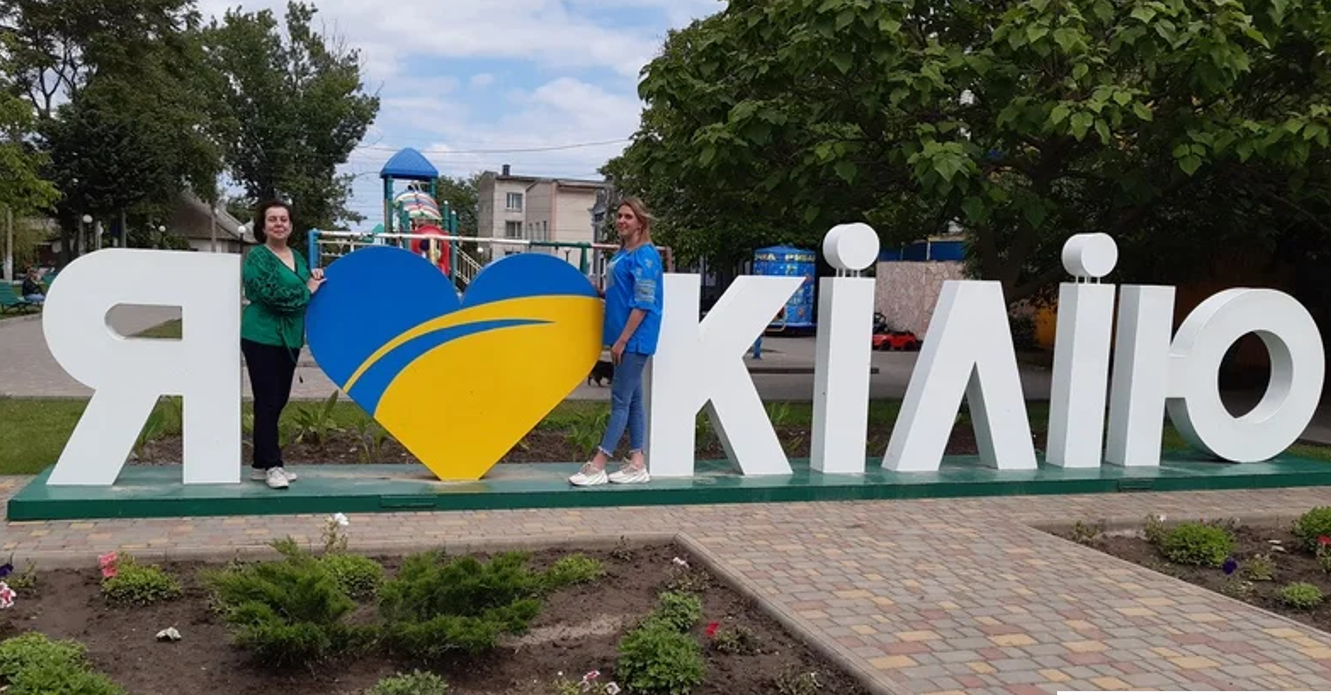
Lyudmyla Yakymenko and Maria Hontar
According to both specialists, documentary films greatly assist them in their work. People compare the experiences of the film’s protagonists with their own lives, which prompts them to open up during meetings. “That is exactly what we need,” adds Maria. “It allows us to understand what issues a person is facing, identify the specific risks relevant to them, and figure out how to help them overcome those situations. People open up through trusting communication — it's far more effective than the usual formal approach.”
Since the beginning of the full-scale invasion, probation units have been entrusted with yet another highly challenging task: working with individuals convicted of collaborationism. To be frank, it is unlikely that their worldview or beliefs can be changed. Nevertheless, efforts must be made. The film club moderators select documentaries about the ongoing war. They admit these films are painful to watch, but they are the only ones that can shake a person out of complacency and, perhaps, prompt them to reconsider their actions.
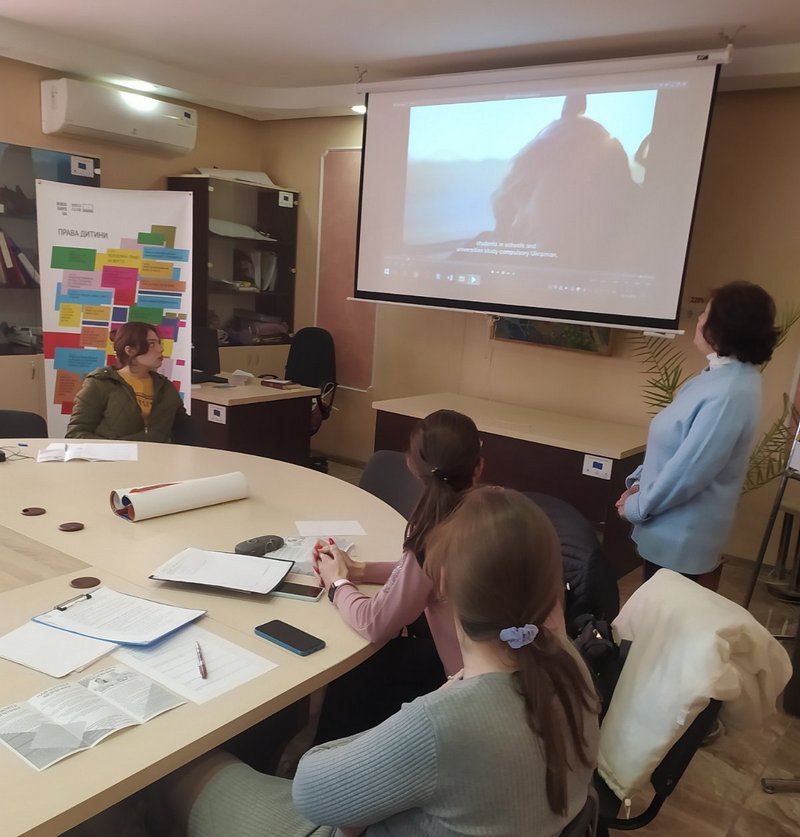
Screening of the film Language for schoolchildren
“Everyone has a chance to change,” Lyudmyla Yakymenko is convinced. “Let me share a story. We had a probationer — a young man who had been convicted of collaborationism back in 2022. We called him Koliasyk. He joined our screenings of such films as ‘Fortress Mariupol. Orest,’ ‘Peace,’ and ‘Euromaidan. Rough Cut’ — films about people who stood up for freedom regardless of gunfire. Koliasyk attended the screenings, often with tears in his eyes. Eventually, he started volunteering at our local aid center. He also began visiting the local Museum of Resistance, where families of fallen soldiers donate medals, clothing, and personal belongings from our men who fought at Zmiinyi Island and other battlefields. He’d listen closely to police officers and soldiers whom we invited to post-screening discussions as expert speakers. Gradually, our Koliasyk grew up — and changed. He became an active member of the community. I truly believe he will continue walking this path.”
The film club in Kiliya is gradually expanding beyond the walls of the Probation Center. The idea to broaden its scope came to the moderators after watching Language by director Serhiy Lysenko. It tells the story of free Ukrainian language courses initiated by volunteers and their trips to the east of the country. Inspired by the film, the moderators decided to launch similar courses in partnership with local activists from the NGO Let’s Protect Together. They discussed the idea with the head of the organization and local volunteers. However, to get the language courses started, they needed books in Ukrainian.
“We decided to turn to our own community — the DOCU/CLUB Network,” says Lyudmyla. “Lina Babych, the Network’s human rights coordinator, shared our need with the Docudays film club at the Lviv Municipal Library, and they responded by sending us 50 Ukrainian-language books! Can you imagine? That’s when we realized that we are not just a single film club in a small town, but part of a large family of like-minded people.”
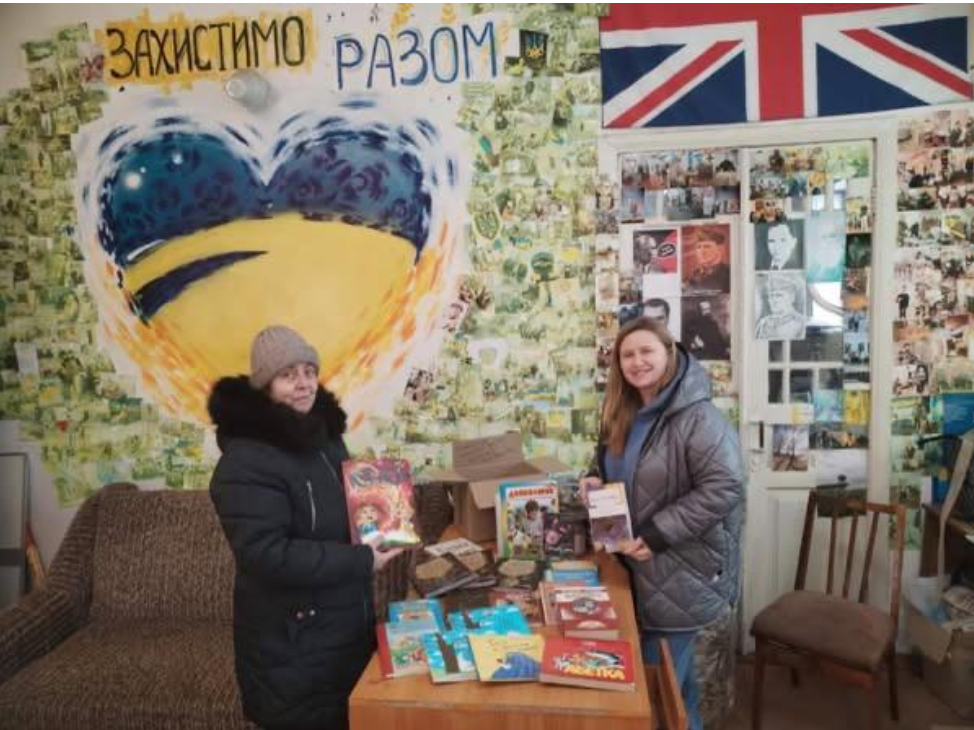
Books from the film club in Lviv
Since the beginning of the year, the film club, together with the entire DOCU/CLUB Network of the NGO Docudays, has joined another major initiative — the awareness campaign “Sexual Abuse on the Internet: How to Protect Children.” This issue is becoming increasingly alarming with each passing year. In partnership with other organizations, NGO Docudays works on educational outreach among teachers, high school students, and their parents to raise awareness of the dangers children face online and provide effective tools for protecting them from sexual abuse in the digital space. The film club in Kiliya has also taken up this important work: its moderators have already established cooperation with local educational institutions, where they organize screenings and discussions of documentary films.
“We’ve been working with them for two years now,” says Lyudmyla Yakymenko. “The response from the children is incredible! We communicate with them sincerely, and they really feel that. We are planning on screening the film ‘Caught in the Net,’ which addresses sexual abuse online. It is a complicated film, but this issue is increasingly relevant, so we must protect our children.”
The moderators also organized a screening and discussion of the film for the particularly vulnerable group of parents whose children are under probation. Since the beginning of the year, they have held screenings at the local Center for Social Services, Employment Center, Child Services Office, and even for officers at the local police department.
This small team of dedicated enthusiasts is full of ideas as well as motivation to bring them to life. “Our engine never stops — we just keep starting it up again and again,” Lyudmyla Yakymenko laughs. “You see how people who once stumbled and were convicted get back on their feet and return to normal life through the power of documentary films. This makes you realize that probation really does help, which is the most valuable result for us.”
The development of the DOCU/CLUB Network is funded by the Embassy of Sweden in Ukraine and the National Endowment for Democracy (NED).
The opinions, conclusions or recommendations do not necessarily reflect the views of respective governments or charitable organizations of these countries. The author(s) of this publication are solely responsible for its content.
All news


